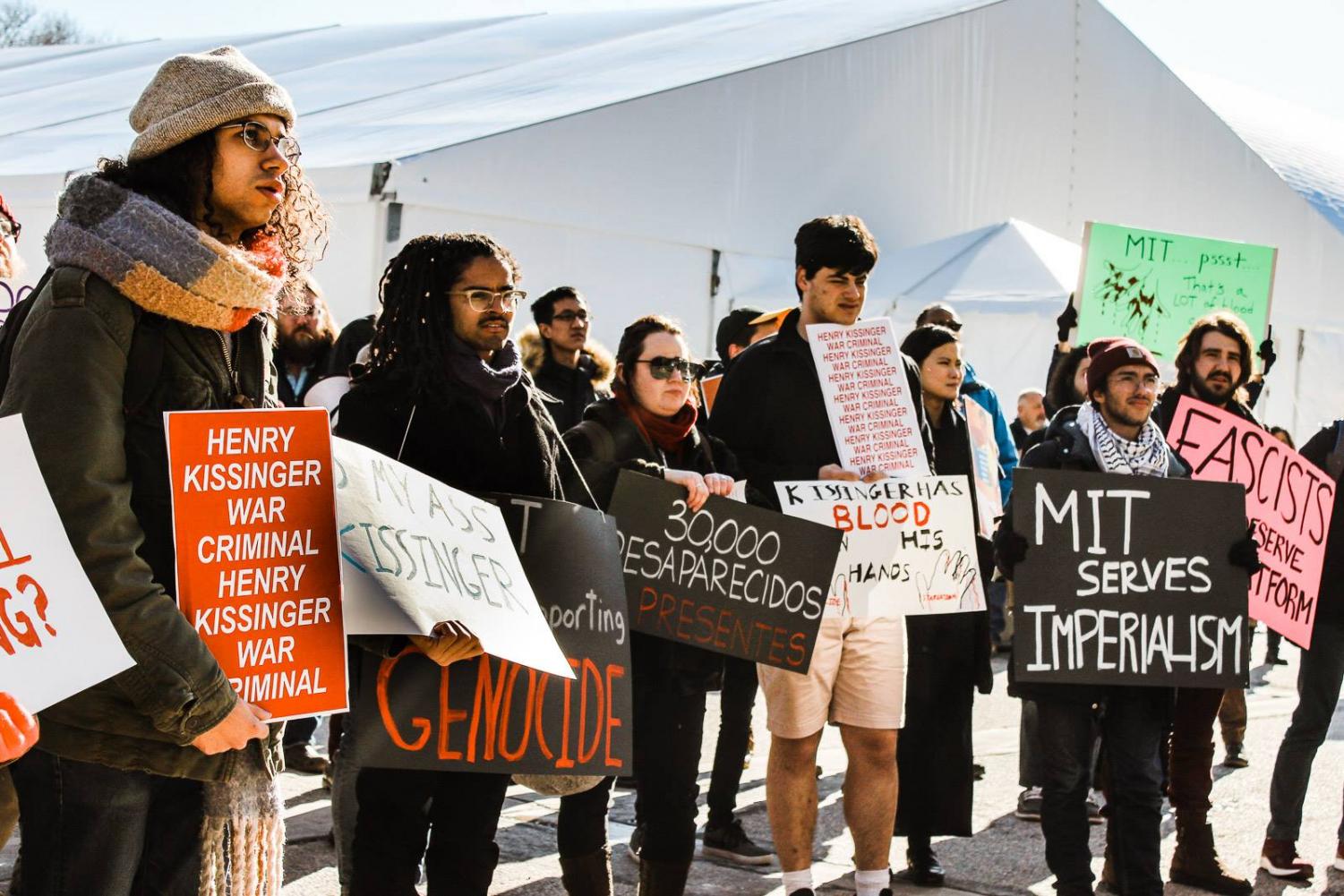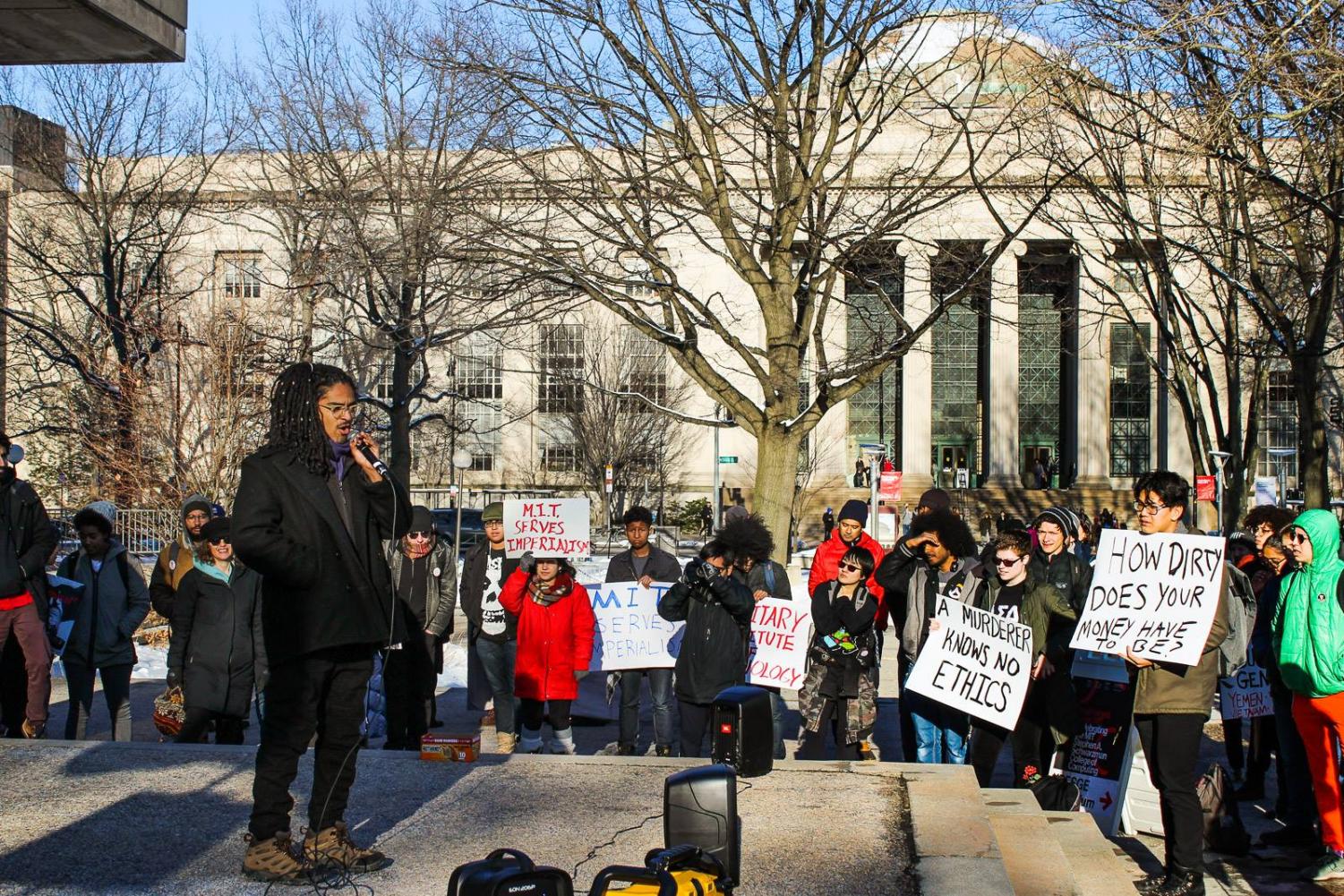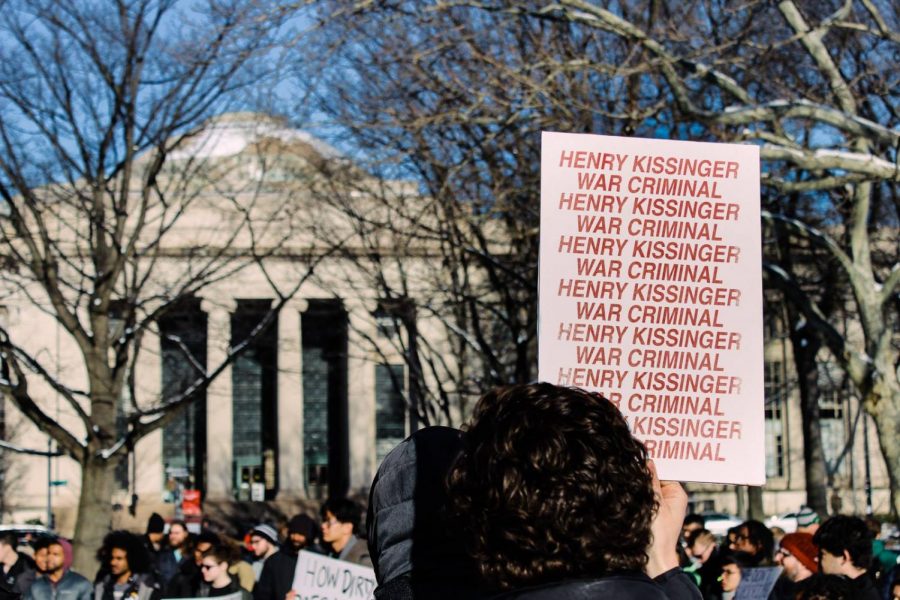Met by protesters, Kissinger speaks at MIT on AI
Kimberly Barzola, MIT Students Against War
A protester holds up a sign opposing former U.S. Secretary of State Henry Kissinger at an event celebrating MIT’s new Stephen A. Schwarzman College of Computing.
March 13, 2019
Former Secretary of State Henry Kissinger spoke at the Massachusetts Institute of Technology Feb. 28, drawing protests from students and community members alike. Kissinger was invited by the university to celebrate the opening of the Stephen A. Schwarzman College of Computing. Protests were organized by the student group “MIT Students Against War,” which gathered with community groups outside Kresge Auditorium, where the event took place.
During his speech, Kissinger focused on the importance and danger that the development of artificial intelligence technology poses. “Working in this field is a tremendous responsibility and a tremendous challenge,” Kissinger said.
Joining Kissinger was Stephen Schwarzman, the chairman and CEO of The Blackstone Group. According to a press release from MIT president L. Rafael Reif, Schwarzman donated $350 million to open the college for artificial intelligence in October 2018.
Husayn Karimi, an undergraduate computer science major at MIT and one of the demonstration’s organizers, said the group hoped to inform people about the school’s financial ties.
“We hope to educate people about Kissinger and MIT’s primary motives behind this college,” Karimi said. “It’s about how MIT uses college development to fund U.S. and Saudi Arabia military interests.”

Students and community members join MIT Students Against War in protesting Henry Kissinger Feb. 28.
Other protesters had different views on what Kissinger represented, however. Joe Tache, a 2018 Northeastern graduate, said he saw a connection between the current Venezuelan crisis, in which a challenger to President Nicolás Maduro is claiming to be the rightful winner of a recent election and the country rejected foreign aid from the United States, which formally recognized the challenger as the rightful president. .
“[The United States] is organizing a coup to overthrow the popular democratic government led by Nicolás Maduro,” Tache said to the crowd. “The U.S. coup of Venezuela is like the coups Kissinger orchestrated against the global south.”
Protesters also took issue with Northeastern’s relationship with Raytheon, a defense contractor and weapons manufacturer.
“MIT might have Northeastern beat in the complicity of the military industrial complex,” Tache said.
Ryan Costello, a community member and a part of the “Coalition to Stop the Genocide in Yemen,” said what he thought inviting Kissinger meant.
“MIT is willing and eager to work with power-hungry corporations in giving a platform to war criminal Kissinger who oversaw the bombing of Cambodia,” Costello said. “I think it’s sad and people are responding to that.”
Chants varied from calls of “Kissinger, you can’t hide, you committed genocide” to “No platform for war criminals.” Behind the speakers, a large balloon resembling a missile floated in the air.
Some who attended the event showed little interest either the protesters or Kissinger himself. One attendee, Ignacio Fuerez, didn’t even know Kissinger was booked at the event.
“Kissinger is speaking?” Fuerez said.
The protest had a crowd of around 100 protesters and several police officers keeping watch.

Protesters gather outside MIT’s Kresge Auditorium as Kissinger speaks on the dangers of AI.
Louis Martinez, a doctoral student at MIT who attended Kissinger’s speech, weighed in on the importance of a new college of computing.
“I think [the college] is important to make sure that some things are done right,” Martinez said. “The only thing that is certain is that the future will change, so we have to make sure we change it in the right way.”
Another attendee, Wujie Wang, was less enthused about the necessity of the new college.
“I’m not sure about the need for a new college. We already have a computer science school,” Wang said. “In regards to the protesters, I’ve never been exposed to something like this, but they are behaving in a good manner, and they should be allowed to demonstrate their ideas.”
In response to protests, MIT Provost Marty Schmidt issued a statement addressing the controversial decision.
“Last summer, Dr. Henry Kissinger wrote a provocative reflection for The Atlantic that addressed his views on the ethics and dangers of artificial intelligence, topics directly relevant to the launch program,” Schmidt said in the statement. “We hope the event will allow for many voices to explore the social impacts of AI, an issue that matters deeply to MIT and that bears on the challenges we aim to address with the College.”







